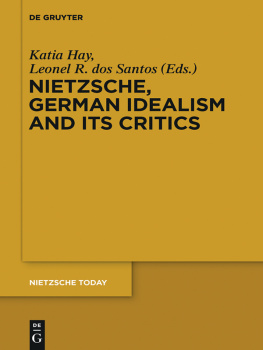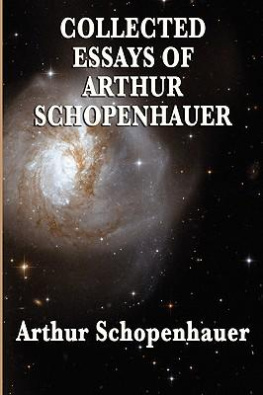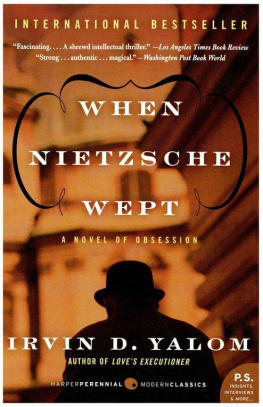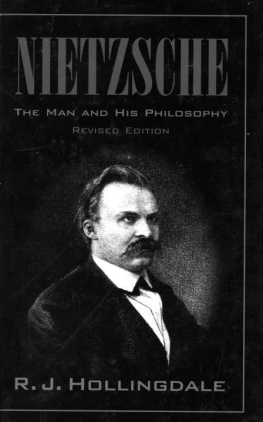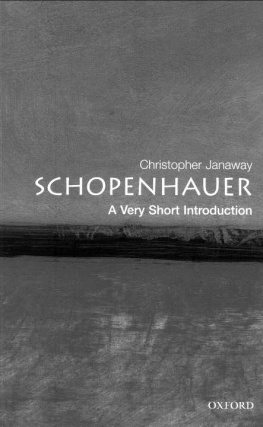Concentric Space as a Life Principle beyond Schopenhauer, Nietzsche and Ricoeur
Concentric Space as a Life Principle beyond Schopenhauer, Nietzsche and Ricoeur invites a fresh vision of human experience and search for life meanings in terms of potential openings through relational space. Offering a radical spatial rereading of foundational ideas of the influential thinkers Schopenhauer, Nietzsche and Ricoeur, it argues that these ideas can be rethought for a more fundamental understanding of life, self and other.
This book offers a radical reconceptualisation of space as an animating principle for life through common, although previously hidden, features across the thought of Schopenhauer, Nietzsche and Ricoeur. It offers a fresh spatial interpretation of key themes in these thinkers works, such as compassion, will to life, Dionysian rapture, will to power, selfovercoming, re-valuation of values, eternal recurrence, living metaphor and intersubjectivity. It proposes a spatial restructuring of experience from diametric spaces of exclusion towards concentric spaces of inclusion for an experiential restructuring towards unifying modes of experience. This spatial rereading of these major figures in philosophy directly challenges many previous understandings, to offer a distinctive spatial-phenomenological framework for examining a life principle.
This book will appeal to academics, researchers and postgraduates engaged in the study of philosophy, wellbeing, education and human development. The books interdisciplinary scope ensures that it is also of interest for those in the fields of psychology, anthropology, psychoanalysis and culture studies.
Paul Downes is Associate Professor of Psychology, School of Human Development, Institute of Education, Dublin City University, Ireland. He has over 100 international peer-reviewed publications across areas of philosophy, psychology, education, law, anthropology and social policy and has given keynotes and invited presentations in 29 countries.
First published 2020
by Routledge
2 Park Square, Milton Park, Abingdon, Oxon OX14 4RN
and by Routledge
52 Vanderbilt Avenue, New York, NY 10017
Routledge is an imprint of the Taylor & Francis Group, an informa business
2020 Paul Downes
The right of Paul Downes to be identified as author of this work has been asserted by him in accordance with sections 77 and 78 of the Copyright, Designs and Patents Act 1988.
All rights reserved. No part of this book may be reprinted or reproduced or utilised in any form or by any electronic, mechanical, or other means, now known or hereafter invented, including photocopying and recording, or in any information storage or retrieval system, without permission in writing from the publishers.
Trademark notice: Product or corporate names may be trademarks or registered trademarks, and are used only for identification and explanation without intent to infringe.
British Library Cataloguing-in-Publication Data
A catalogue record for this book is available from the British Library
Library of Congress Cataloging-in-Publication Data
A catalog record has been requested for this book
ISBN: 978-1-138-30693-6 (hbk)
ISBN: 978-1-315-14212-8 (ebk)
For my wife, Aleksandra Jasniewicz, and our children, Eva and Michael Downes, with love
Chapter 3 builds on my article, Downes, P. (2017). Reconceptualising Schopenhauers Compassion through diametric and concentric spatial structures of relation, Enrahonar: An International Journal of Theoretical and Practical Reason, 60, 8198.
Chapter 9 is based on Downes, P. (2016). At the threshold of Ricoeurs concerns in La Mtaphore Vive: a spatial discourse of diametric and concentric structures of relation building on Lvi-Strauss, Ricoeur Studies/Etudes Ricoeuriennes, 7 (2), 146163.
Chapter 10 is based on Downes, P. (forthcoming, 2019). A living spatial movement of relation reconceptualising key aspects of Ricoeurs Oneself as Another and Heideggers Being and Time, Ricoeur Studies/Etudes Ricoeuriennes.
Arthur Schopenhauer
| FRP | On the Fourfold Root of the Principle of Sufficient Reason and Other Writings. Trans. D. E. Cartwright, E. E.Erdmann and C. Janaway. Cambridge: Cambridge University Press (1813/2012), Payne, NY: Dover Publications, Inc. (/1958). |
| MN | Metaphysik der Natur: Herausgegeben und eingeleitet von Volker Spierling, Philosophische Vorlesungen, Teil II. Munich, Zurich: Serie Piper (1984). |
| OBM | On the Basis of Morality. Trans. E. F. J. Payne. Providence, RI: Berghahn Books (1839/1995). |
| WN | On the Will in Nature. Trans. E. F. J. Payne. New York: Berg (1992). |
| WWRI | The World as Will and Representation, Volume I. Trans. J. Norman, A. Welchman and C. Janaway. Cambridge: Cambridge University Press (1859/2010). |
| WWRII | The World as Will and Representation. Volume II. Trans E. F. J. Payne. |
Friedrich Nietzsche
| BGE | Beyond Good and Evil: Prelude to a Philosophy of the Future. Trans. Helen Zimmern. New York: Dover Publications, Inc. (1997). |
| BT | The Birth of Tragedy. Trans. D. Smith. Oxford: Oxford University Press (1872/2000). |
| D | Daybreak. Trans. R. J. Hollingdale. Cambridge: Cambridge University Press (1881/1982). |
| EH | Ecce Homo. Trans. Duncan Large. Oxford: Oxford University Press (2007). |
| GM | The Genealogy of Morals. Trans. Horace B. Samuel. New York: Dover Publications Inc. (2003). |
| GS | The Gay Science. B. Williams (ed.). Trans. J. Nauckhoff and A. del Caro. Cambridge: Cambridge University Press (2001). |
| HH | Human, All Too Human. M. Faber (ed.). London: Penguin (1878/1994). |
| WP | Will to Power. Trans. W. Kaufmann and R. J. Hollingdale; W. Kaufmann (ed.). New York: Vintage Books (1968). |
| Z | Thus Spoke Zarathustra. Trans. W. Kaufmann. New York: Viking (18835/1954). |
Paul Ricoeur
| HHS | Hermeneutics and the Human Sciences. Trans. J. B. Thompson. New York: Cambridge University Press (1981). |
| MV | La Mtaphore Vive. The Rule of Metaphor: Multi-disciplinary Studies of the Creation of Meaning in Language. Trans. R. Czerny, with K. McLoughlin and J. Costello. London: Routledge (1978). |
| OA | Oneself as Another. Chicago, IL: University of Chicago Press (1994). |
A protolanguage of space as concentric and diametric space
The question of a veil of space must be identified and opened to engage with a life force, so that space is no longer a sterile medium for experience and thought. Habits of space need to be exposed to interrogate the ripples of space invading conceptual foundations of a life principle.
There is a spatial system of relations, a primordial spatial discourse pertaining to life that is embedded in the seminal works of Schopenhauer, Nietzsche and Ricoeur and yet overlooked by each of them. All three thinkers invoke a prior spatial discourse implicitly in their works. Like Wordsworth, who crossed the Alps without realising it, they have opened the door to a prior level of understanding. However, they have not directly walked through these gateways. Passing through the frames of these doors brings with it a reverberation, a movement that rustles the foundations of each of these thinkers works so that the prior spatial discourse opens up their texts, unsettles their basic assumptions and invites reconstruction of each of their understandings of a life principle.





